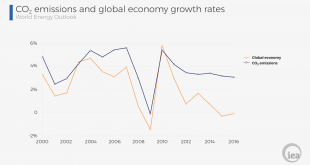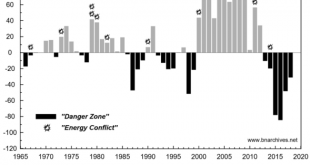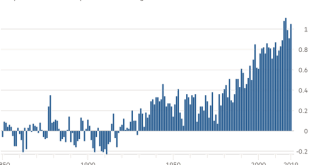One of the more tenacious beliefs on the political right is that their support for nuclear power demonstrates superior rationality and openness to evidence. But the evidence is that, no matter what the structure of energy markets no one is willing to choose (new) nuclear power over any of the alternatives: gas, renewables and coal. That’s bad in the sense that the true costs of new and existing coal far exceed those of even new nuclear. But where those costs are factored in to...
Read More »Economic growth and carbon emissions are closely linked.
source
Read More »Climate change and the strange death of libertarianism
It wasn’t that long ago that everyone was talking about the “libertarian moment” in the US. Now, libertarianism/propertarianism is pretty much dead. The support base, advocacy groups and so on have gone full Trumpists, while the intellectual energy has shifted to “liberaltarianism” or, a more recent variant, Tyler Cowen’s conversion to “state capacity libertarianism“. Most of those departing to the left have mentioned the failure of libertarianism to handle climate change. It was...
Read More »CfP: Dialogue on economics curriculum reform
Call for papers Dialogue on economics curriculum reform between Chinese and Western Scholars 15th WAPE Forum, Athens, 31 July to 1 August 2020 Dear Friend We cordially invite you to submit proposals for papers on curriculum reform and economics teaching, for a discussion at the forthcoming conference of the World Association for Political Economy (WAPE), which will be held in Athens from 31st July to 2nd August, and is hosted by the Greek Association of Political Economy and Panteion...
Read More »Economists saving the world …
from Lars Syll
Read More »Unrealistic mental models 6
from Asad Zaman In the previous post (Three Types of Models 5), we discussed three types of models. The first type is based purely on patterns in observations, and does not attempt to go beyond what can be seen. This is an “observational” or Baconian model. The second type attempt to look through the surface and discover the hidden structures of reality which generate the observations we see. The best approach to this type of models has been developed by Roy Bhaskar, so we can call it a...
Read More »Open thread Jan 17, 2020
Still in the danger zone
from Shimshon Bichler and Jonathan Nitzan In December 2017, we posted a RWERB entry, titled ‘Profit warning: there will be blood’. We warned that, although the Weapondollar-Petrodollar Coalition might no longer be in the Middle East driver’s seat, the oil and armament companies, the region’s oil-exporting autocracies and various non-state groups were all keen on seeing their oil incomes rise from record lows. And we observed that, in this context, ‘the prospects of a new energy conflict,...
Read More »Does it — really — take a model to beat a model?
from Lars Syll A critique yours truly sometimes encounters is that as long as I cannot come up with some own alternative model to the failing mainstream models, I shouldn’t expect people to pay attention. This is, however, to totally and utterly misunderstand the role of philosophy and methodology of economics! As John Locke wrote in An Essay Concerning Human Understanding: The Commonwealth of Learning is not at this time without Master-Builders, whose mighty Designs, in advancing the...
Read More »In half a century what have we done with that knowledge?
from Edward Fullbrook A version of this graph appeared in yesterday’s Guardian. I have a vivid memory from almost exactly half a century ago that relates to it. It was February 1970 and snowing. It was rural Wisconsin in the States and I was riding in a car with a woman who was the mother of six and a well-known peace activist but with no connection to science or environmentalism. We were coming from Frank Lloyd Wright’s estate Taliesin where I lived, and as we neared Madison and...
Read More » Heterodox
Heterodox





